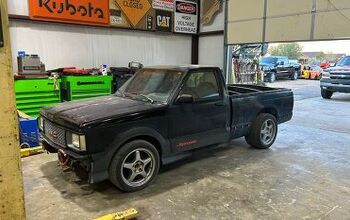Party Time In Japan: Car Sales Up For First Time In Seven Years

Today is a big day. It’s April Fools Day. March numbers of U.S. auto sales will come out (we’ll get to that later.) Also, it is the beginning of one of the many Japanese oddities, called the fiscal year. The Japanese fiscal year spans from April 1 in the current year to March 31 in the next. So as far as the Japanese fiscal year is concerned, today is New Year! And it’s time to look back at Japanese auto sales. For the first time in what seemed to be an eternity, we can look back at Japanese auto sales without tears in our eyes. Or with gnashing teeth, depending on which side we’re on: Sales are up! Honto?
Domestic sales of new vehicles rose 10 percent on the year to 3.18 million units in fiscal 2009, the Japan Automobile Dealers Association told The Nikkei [sub].
The rise is being blamed on government subsidies and tax breaks for environment-friendly cars. This is the first time in seven years that Japanese sales were up. It is also the first double-digit increase in two decades. Sales of standard-size passenger cars climbed 22.7 percent to 1.34 million units, subcompact cars increased 9.1 percent to 1.55 million units. The preliminary data excludes minivehicles, which are counted and reported separately.
The fiscal year data received a solid push from March sales. As indicated by previously reported output numbers, March has been an exceptionally good month in Japan. New vehicle sales rose 37.2 percent year on year to 443,298 units in March, the eighth straight month of increase, the Japan Automobile Dealers Association told The Nikkei [sub]. Again, no minivehicles in those data, we’ll report them when we get them.
Update: Minivehicle sales are in. Not quite as boisterous as regular cars, but the recently laggardly segment of kei cars was up also in March, says The Nikkei [sub]. Minivehicle sales rose 3.7 percent year on year to 231,196 units in March, the Japan Mini Vehicles Association reports.

Bertel Schmitt comes back to journalism after taking a 35 year break in advertising and marketing. He ran and owned advertising agencies in Duesseldorf, Germany, and New York City. Volkswagen A.G. was Bertel's most important corporate account. Schmitt's advertising and marketing career touched many corners of the industry with a special focus on automotive products and services. Since 2004, he lives in Japan and China with his wife <a href="http://www.tomokoandbertel.com"> Tomoko </a>. Bertel Schmitt is a founding board member of the <a href="http://www.offshoresuperseries.com"> Offshore Super Series </a>, an American offshore powerboat racing organization. He is co-owner of the racing team Typhoon.
More by Bertel Schmitt
Latest Car Reviews
Read moreLatest Product Reviews
Read moreRecent Comments
- CanadaCraig My 2006 300C SRT8 weighs 4,100 lbs. The all-new 2024 Dodge Charge EV weighs 5,800 lbs. Would it not be fair to assume that in an accident the vehicles these new Chargers hit will suffer more damage? And perhaps kill more people?
- Akila Hello Everyone, I found your blog very informative. If you want to know more about [url=
- Michael Gallagher I agree to a certain extent but I go back to the car SUV transition. People began to buy SUVs because they were supposedly safer because of their larger size when pitted against a regular car. As more SUVs crowded the road that safety advantage began to dwindle as it became more likely to hit an equally sized SUV. Now there is no safety advantage at all.
- Probert The new EV9 is even bigger - a true monument of a personal transportation device. Not my thing, but credit where credit is due - impressive. The interior is bigger than my house and much nicer with 2 rows of lounge seats and 3rd for the plebes. 0-60 in 4.5 seconds, around 300miles of range, and an e-mpg of 80 (90 for the 2wd). What a world.
- Ajla "Like showroom" is a lame description but he seems negotiable on the price and at least from what the two pictures show I've dealt with worse. But, I'm not interested in something with the Devil's configuration.

































Comments
Join the conversation
With more Japanese moving into bigger cities with public transportation and a low birthrate, Toyo and Honda will most definitely have an interest in achieving future sales growth abroad.
That video is HI-larious!